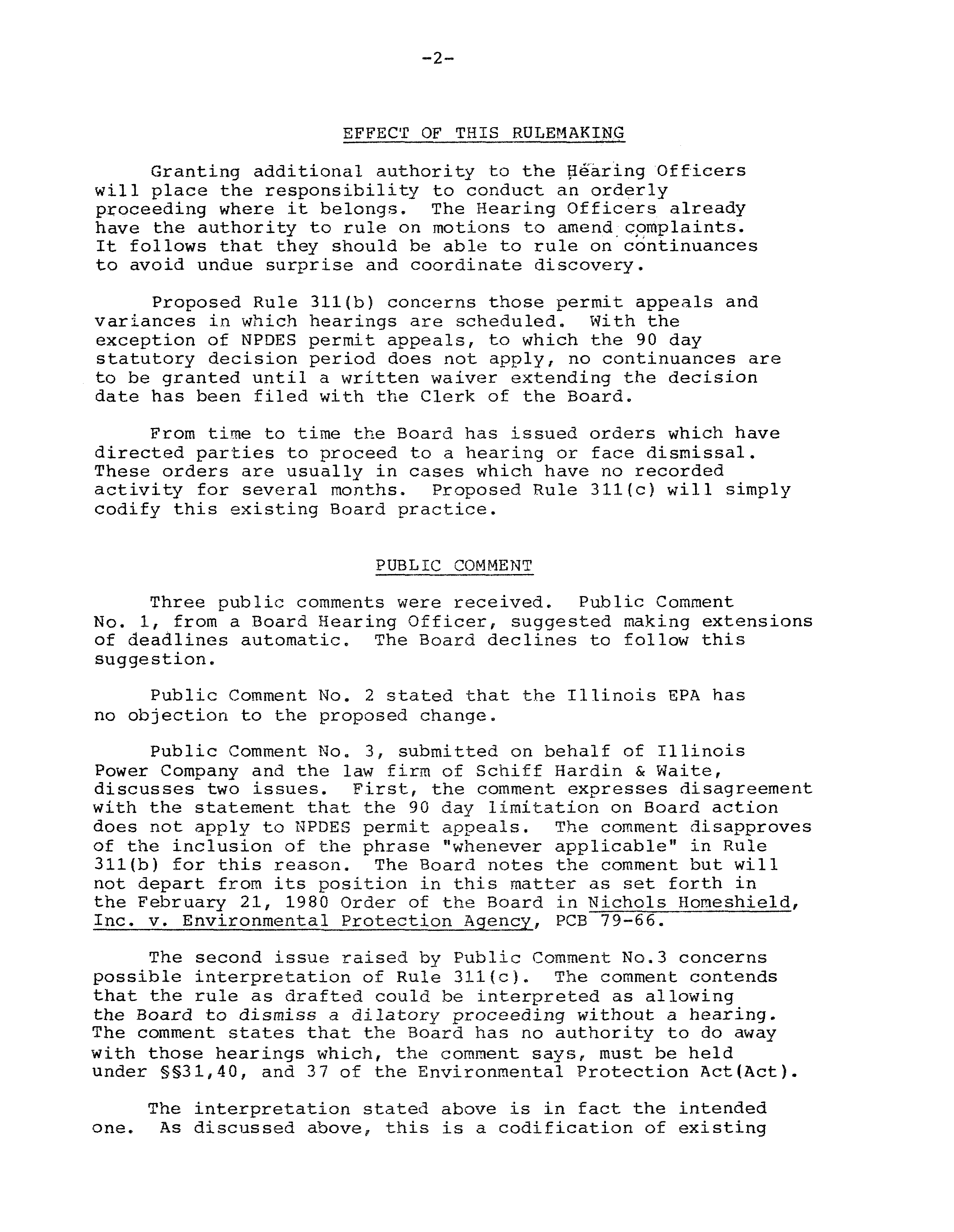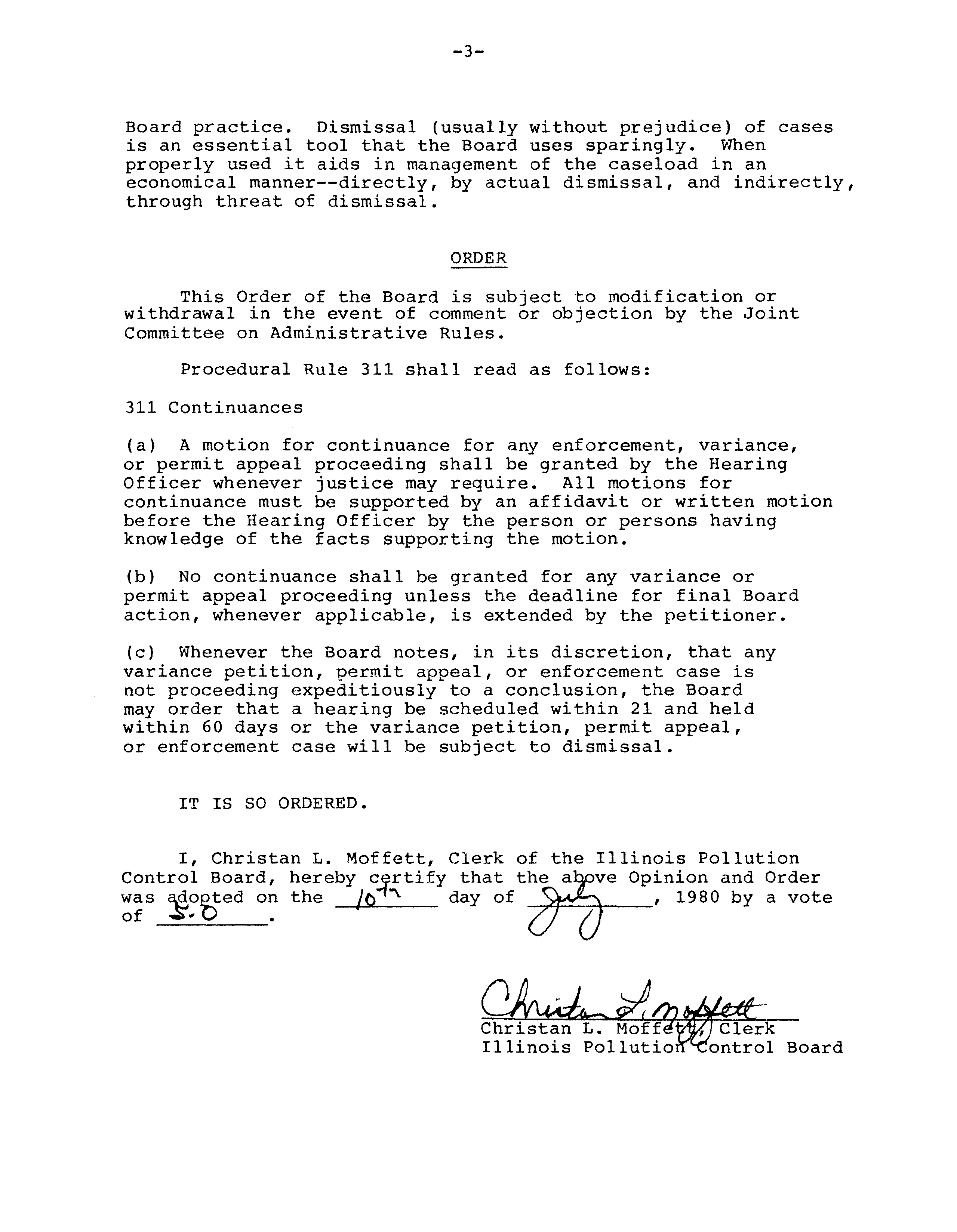ILLINOIS POLLUTION CONTROL
BOARD
July
10,
1980
IN THE MATTER OF:
AMENDMENTS TO THE
)
R80-2
PROCEDURAL
RULES
)
PROPOSED RULE.
SECOND NOTICE.
OPINION AND ORDER OF THE BOARD
(by J.D. Dumelle):
This proceeding was initiated on January
30,
1980 when
the Board received a letter from the Chairman of the
Environmental Law Committee of the Chicago Bar Association
asking that Procedural Rule 311 (Continuances) be amended.
On February
21,
1980 the Board adopted a Proposed Order on
its own motion.
The Proposed Order was published in
Environmental Register 212 dated March
3,
1980 and
in the
March 14,
1980 Illinois Register.
Rule 311
This rule was first adopted by the Board on October
8,
1970
(In the Matter of:
Procedural Rules, R70—4,
1
PCB 43—51).
At that time continuances were granted by the Hearing Officers
upon a showing of necessity and were not limited in their
duration.
Rule 311 was amended by the Board on February
14,
1974 to provide that continuances in excess of 45 days would
require Board action
(see In Matter of: Adoption of Revised
Procedural Rules of the Pollution Control Board, R73—14,
14
PCB 155—158, October 10,
1974).
Rule 311 was amended to its
present form on December 16,
1976
(In the Matter
of: Procedural
Rules Revisions, R75-1,
24 PCB 481-489).
At that time the Board
limited the Hearing Officers’ authority to 45 days per contin-
uance and a total of
90 days.
Continuances in variances and
permit appeals were prohibited unless the statutory deadline
for Board action was extended by the petitioner.
(see In the
Matter of:
Procedural Rule Revisions, R75—1, May 12,
1977,
25
PCB 529,
533).
NEED FOR THIS RULEMAKING
In a fact sheet attached to the January
30,
1980 Chicago
Bar Association letter,
the 45 and 90 day
limitations in Rules
311(a) and
(b) were considered unrealistic.
The Board agrees
that
it is practically impossible
to proceed to a hearing in
an enforcement case,
even with a settlement, within 90 or
even 180 days
of the date a complaint is
filed
(the hearing
officer can presently grant continuances that total
up to
90 days without Board action, which can result
in up to a
180 day period).
The Board has recognized this difficulty by
granting almost every motion for a continuance which has been
filed
in enforcement cases.
—2—
EFFECT OF THIS RULEMAKING
Granting additional authority
to the ~é~áringOfficers
will place the responsibility to conduct an orderly
proceeding where it belongs.
The Hearing Officers already
have the authority to rule on motions to
amend
cpmplaints.
It follows that they should be able to rule on continuances
to avoid undue surprise and coordinate discovery.
Proposed Rule 311(b)
concerns those permit appeals and
variances in which hearings are scheduled,
With
the
exception of NPDES permit appeals, to which the
90 day
statutory decision period does not apply,
no continuances are
to be granted until a written waiver extending the decision
date has been filed with the Clerk of the Board.
From time
to time the Board has issued orders which have
directed parties to proceed to a hearing
or face dismissal.
These orders are usually in cases which have no recorded
activity for several months.
Proposed Rule 311(c) will simply
codify this existing Board practice.
PUBLIC COMMENT
Three public comments were received.
Public Comment
No.
1,
from a Board Hearing Officer, suggested making extensions
of deadlines automatic,
The Board declines to follow this
suggestion.
Public Comment No,
2 stated that the Illinois EPA has
no objection to the proposed change.
Public Comment
No.
3,
submitted on behalf of
Illinois
Power Company and the
law firm of Schiff Hardin & Waite,
discusses two issues.
First,
the comment expresses disagreement
with the statement that the
90 day limitation on Board action
does not apply to NPDES permit appeals.
The
comment disapproves
of the inclusion of the phrase “whenever applicable”
in Rule
311(b) for this reason.
The Board notes the comment but will
not depart from its position
in this matter as set forth in
the February
21,
1980 Order of the Board
in Nichols Homeshield,
Inc.
v. Environmental Protection Agency,
PCB 79—66.
The second issue
raised by Public Comment No.3
concerns
possible interpretation of Rule 311(c).
The comment. contends
that the rule as
drafted could
be interpreted as allowing
the Board
to dismiss a dilatory proceeding without a hearing.
The comment states that the Board has no authority to do away
with those hearings which, the comment says, must be held
under §~31,40, and 37 of the Environmental Protection Act(Act).
The interpretation stated above
is in fact the intended
one,
As discussed above, this is a codification of existing
—3—
Board practice.
Dismissal
(usually without prejudice) of cases
is an essential tool that the Board uses sparingly.
When
properly used it aids
in management of the caseload in an
economical manner——directly,
by actual dismissal,
and indirectly,
through threat of dismissal.
ORDER
This Order of the Board is subject to modification or
withdrawal
in the event of comment or objection by the Joint
Committee on Administrative Rules.
Procedural Rule 311 shall read as follows:
311 Continuances
(a)
A motion for continuance for any enforcement, variance,
or permit appeal proceeding shall be granted by the Hearing
Officer whenever justice may require.
All motions for
continuance must be supported by an affidavit or written motion
before the Hearing Officer by the person or persons having
knowledge of the facts supporting the motion.
(b)
No continuance shall be granted for any variance or
permit appeal proceeding unless the deadline for
final Board
action, whenever applicable,
is extended by the petitioner.
(c)
Whenever the Board notes,
in its discretion,
that any
variance petition, permit appeal,
or enforcement case
is
not proceeding expeditiously to a conclusion, the Board
may order that a hearing be scheduled within 21 and held
within 60 days or the variance petition, permit appeal,
or enforcement case will he subject to dismissal.
IT
IS SO ORDERED.
I, Christan L.
Moffett, Clerk of the Illinois Pollution
Control Board,
hereby c rtify that the
a
ye Opinion and Order
was ~o~ted
on the
_________
day of
___________,
1980 by
a vote
Christan L. Moff~
,
Clerk
Illinois Pollutio
ontrol Board



